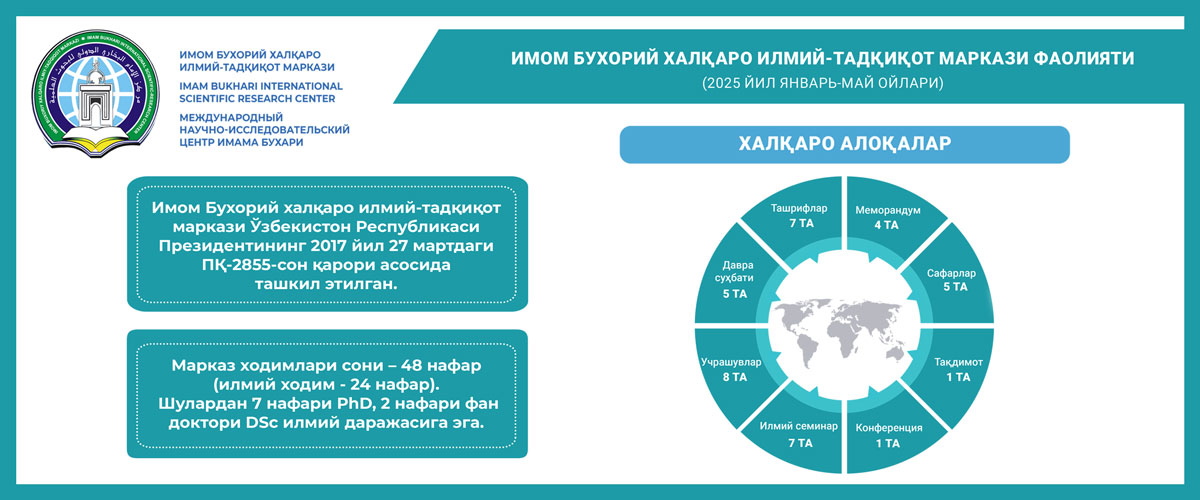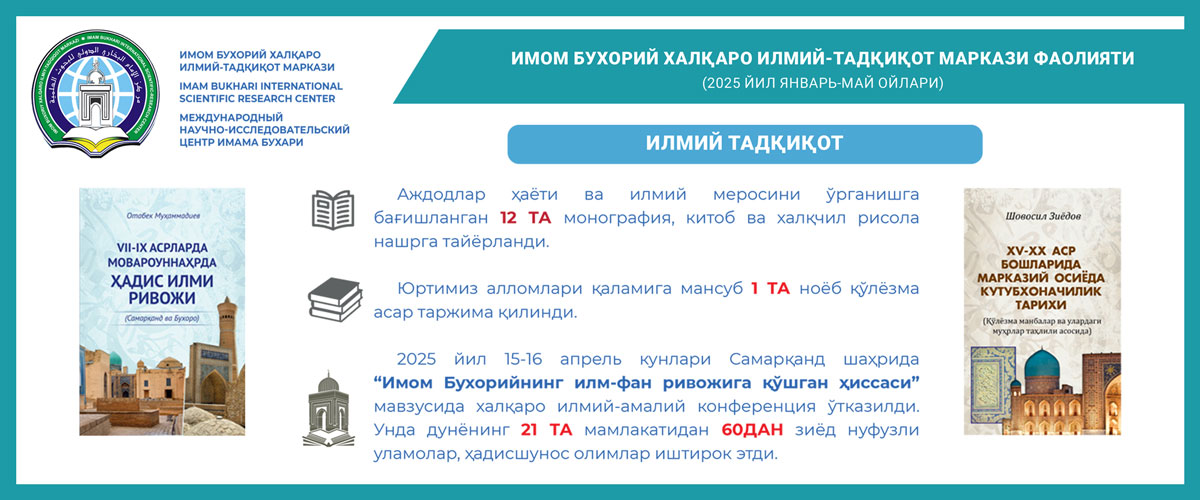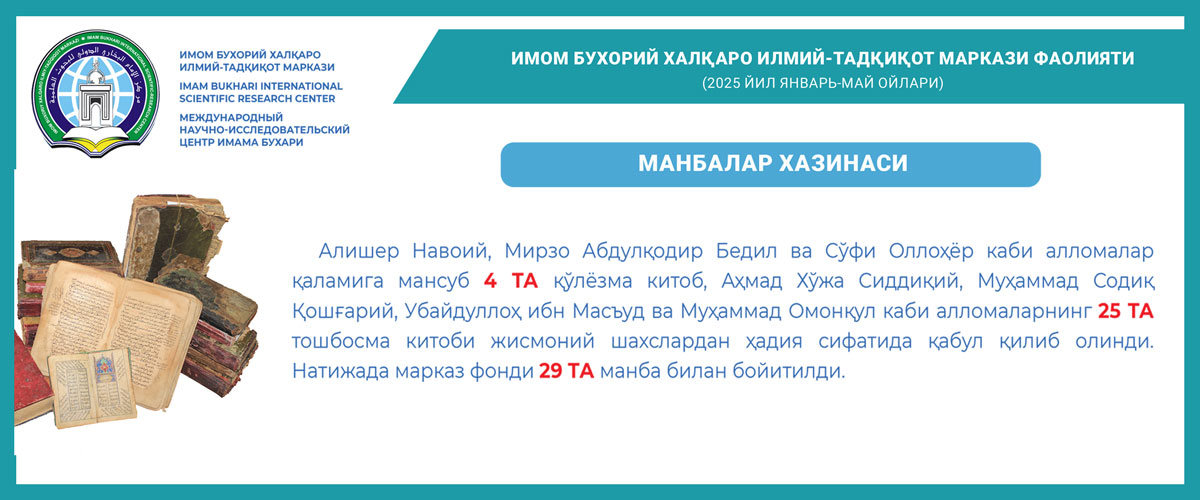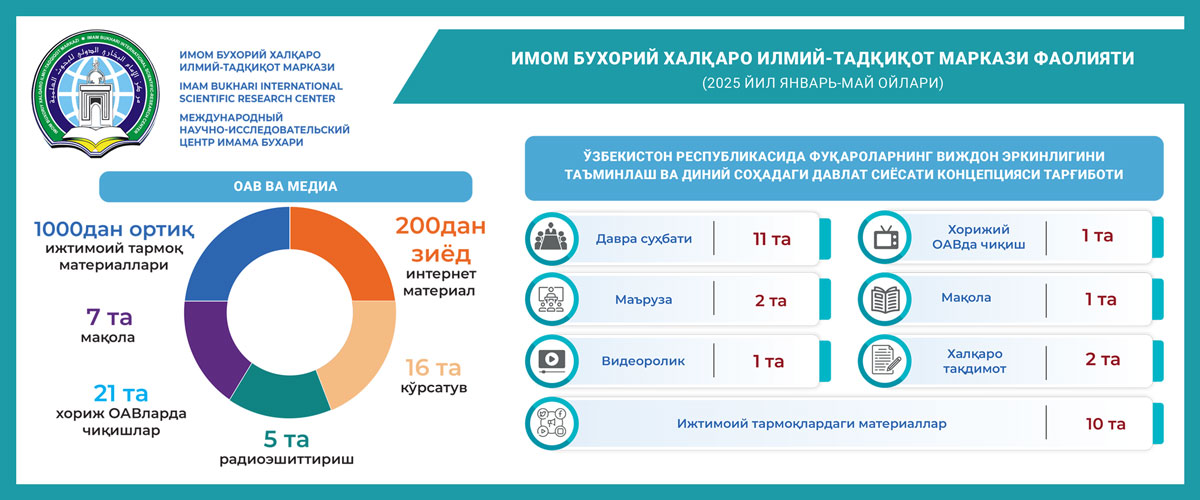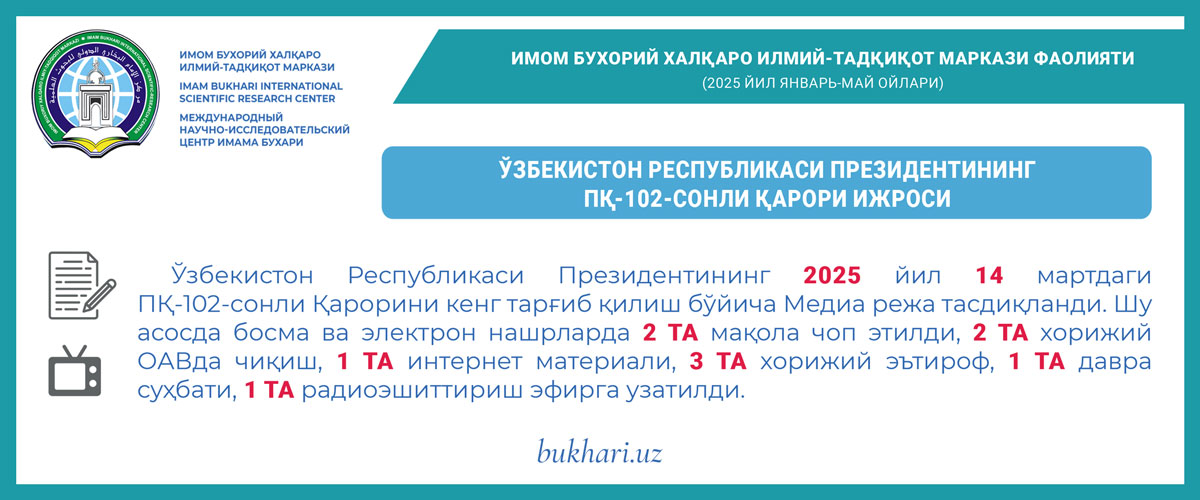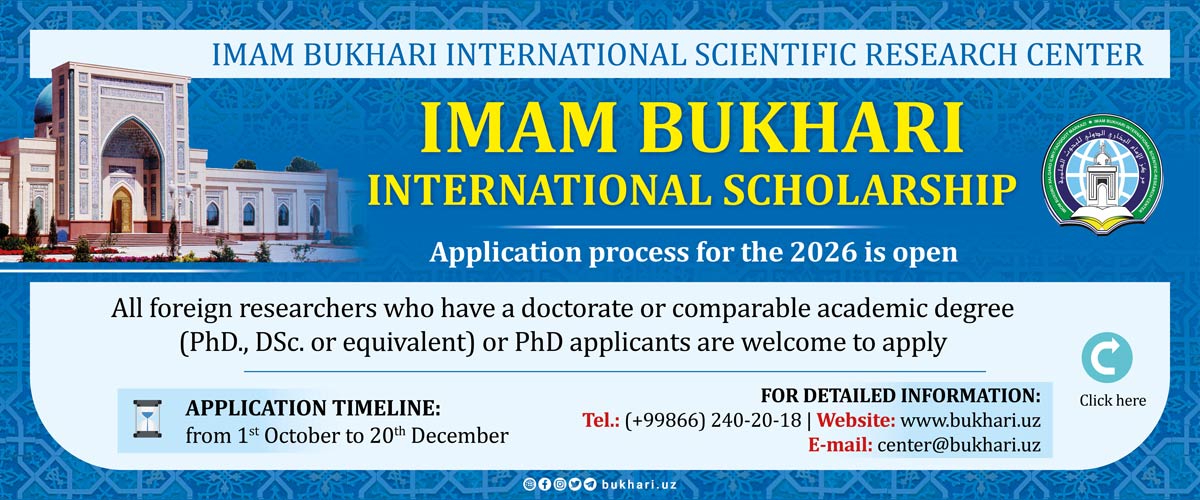Then he visited Kufa and stayed in this city for some more time. In this manner, he also yisited Baghdad once more. Concerning his visits to Baghdad, his personal secretary al-Varraq mentioned the words: “I don’t remember how many times I have visited Kufa and Baghdad for consultations with the leading experts in the world of Hadiths”. In his book “Tahziybu-l-asmai va-l-lugha” a historian an-Navavi mentioned the following names of the leading experts of the Islamic world as tutors and teachers of Imam al-Bukhari: Abdullah ibn Musa, Abu Na’iym Ahmad ibn Yaqub Ismail ibn Aban, al-Hasan ibn Rabi’, Khalid ibn Mukhallad, Sa’iyd ibn Khafas, Talaq ibn Ghunam, Umar ibn Khafas Urva, Qabiysa ibn A’qba and Abu Ghasson. Having believed that their Hadiths were true and rightful al-Bukhari used to copy them out for his collection.
At that period of history Baghdad was the capital city of the Abbasid Caliphate and the centre of science and culture. Therefore, well-known learned people used to come and live in this city where Imam al-Bukhari had always been welcomed and respected by these experts and other colleagues. There he was taught by such tutors and teachers as Imam Ahmad ibn Hanbal, Muhammad ibn Isa as-Sabba, Muhammad ibn Saiq, Shurayh ibn an-Nu’man and others. In his book “Taqyid al-Muhmal” Imam Abu Ali al-Ghassani mentions that Imam al-Bukhari had visited Baghdad for eight times and at the end of his stay in Baghdad he decided to leave for Khorasan. When he was about to leave his teacher, Imam Ahmad ibn Hanbal re marked with pity: “Are you leaving the science and its fans for Khorasan?”
After several years of this leave, the ruler of Bukhara of that time Abu Tahir az-Zuhli organized calumny against Imam al-Bukhari. He remembered the words of his teacher, suffered much from this slander, and said with a great sorrow: “Now I understand the meaning of the words of his Excellency Ahmad ibn Hanbal.”
Imam al-Bukhari also visited Syria and attended the lessons of such famous experts of Islamic sciences as Yusuf al-Faryabi, Abu Nasr ibn Ibrahim, Adam ibn Abu Iybas Abul Yaman al-Hakim ibn Nafi’ and Hayvat ibn Shuriyh. Then he went to Egypt to attend the lessons of such famous experts of the science of Hadiths as Usman ibn as-Sagh, Sa’id ibn Abu Maryam, Abdullah ibn Salih, Ahmad ibn Salih, Ahmad ibn Shubayb, Asbagh ibn al-Faraj, Sa’id ibn Abu Isa, Sa’id ibn Kasir ibn Afiyr, Yahya ibn Abdullah ibn Bakr and some others. Some sources inform us that Imam al-Bukhari also paid a visit to Mesopotamia (Jazeyra) and had interesting talks with such figures as Ahmad ibn Abu-l-Malik al-Harrani, Ahmad ibn Yazid al-Harrani, Amru ibn al-Khalaf and Ismail ibn Abdullah ar-Raqqi. However, a famous historian and scientist Tajiddin as-Subki wrote in his book “At-Tabaqat ash-Shafi’iya al-Kubra” that Imam al-Bukhari had never visited al-Jazeyra and he had cited his Jazeyrian Hadiths from other sources. Besides, al-Bukhari is said to have had lessons from such well-known figures of Khorasan: in the city of Marv he had lessons from such scientists as Ali ibn Hasan ibn Shaqiyq, Abdan, Muhammad ibn Muqadil and others; in Balkh he was taught by Makki ibn Ibrahim, Yahya ibn Bishar, Muhammad ibn Abon, Hasan ibn Shuja’, Yahya ibn Musa and Qutayba; in Herat he studied Hadiths from Ahmad ibn Valiyd al-Hanafi; in Nishapur he had effective talks on Hadiths with Yahya ibn Yahya, Bashar ibn al-Hakam, Is’haq ibn Rahvayh and Muhammad ibn Rafi; in Ray he had effective meetings with such figures as Ibrahim ibn Musa; in Vasit he studied Hadiths from Hisan ibn Hisan ibn Abdullah and Said ibn Abdullah. Besides, a well-known historian of the 15th century Sharafuddin Ali Yazdi wrote in his book “Zafarname” that al-Bukhari had lived in Kesh for a definite of time as well.
Imam al-Bukhari visited the above-mentioned countries and cities with only one purpose: he wanted to have meetings and effective talks with the leading experts of the science of Hadiths and to cite the new ones from them and thus to enrich his knowledge in this field of science. The author of “The History of Baghdad” al-Khatib al-Baghdadi cites the words of a scientist Ja’far ibn Muhammad al-Qattan that once he said: “I remember Imam al-Bukhari say that he had had written Hadiths being guided by thousands or perhaps more experts of the science of Hadiths and there was not a single Hadith’ in his book that had not shown the detailed chain of roviys”.
Historians of that time also gave some information about the number of his teachers and tutors. For instance, a scientist Muhammad ibn Hatam writes that in one of the conversations with him Imam al-Bukhari mentioned: “I have written Hadiths from one thousand and eighty sheikhs (experts)”. A scientist from Isfahan (Iran) Muhammad ibn Is’haq ibn Manda al-Isfahani (922-1005) made a special bibliography of the teachers of Imam al-Bukhari in an alphabetical order. Our countryman who lives in Saudi Arabia nowadays by name Nazar Muhammad al-Faryabi investigated this problem and in 1991 published a small book titled “Names of Imam al-Bukhari’s teachers” in the publishing house “Maktabat al-Kavsar”. This book seems to include more interesting and thorough information about Imam al-Bukhari’s teachers, and we would like to inform about this book in detail.
We consider that it would be more purposeful if we presented some information about the author of the book. His full name is Muhammad ibn Is’haq ibn Manda al-Isfahani. According to the Islamic calendar, he was bom in 309/310 A.H. in Isfahan (Iran). Approximately at the age of twenty he decided to visit the neighbouring countries and came straight to Nishapur and via al-Iskandaria (Alexandria) came to Basra, Herat, Sijistan, and not entering Azerbaijan came to Shash (now Tashkent). When he came back home from this trip,he brought home a great number of books which could be carried on a caravan consisting of forty camels. As the sources inform us, nobody among the readers of the Holy Qur’an could have collected such a great amount of precious information about the spiritual values of humanity as the author of the book could manage. Al-Isfahani used to say: “I have twice made a pilgrimage to both East and West. I have never heard a Hadith from those who do not have their own viewpoints and reliable outlook on the question under discussion and have changeable ideas”.
Ubaydulla Uvatov Professor, Doctor of History
Press service of ISRCIB
 Imom Buxoriy xalqaro ilmiy-tadqiqot markazi bukhari.uz
Imom Buxoriy xalqaro ilmiy-tadqiqot markazi bukhari.uz
